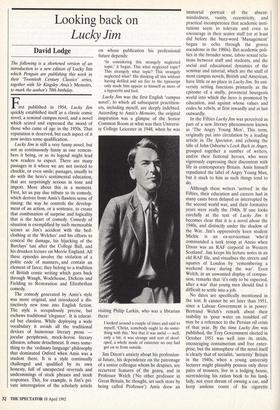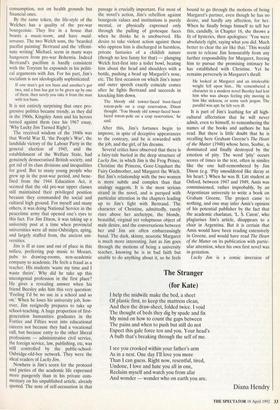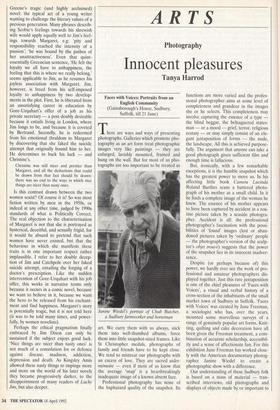Looking back on Lucky Jim
David Lodge
The following is a shortened version of an introduction to a new edition of Lucky Jim which Penguin are publishing this week in their 'Twentieth Century Classics' series, together with Sir Kingsley Amis's Memoirs, to mark the author's 70th birthday.
Frst published in 1954, Lucky Jim quickly established itself as a classic comic novel, a seminal campus.novel, and a novel which seized and expressed the mood of those who came of age in the 1950s. That reputation is deserved, but each aspect of it now invites some qualification.
Lucky Jim is still a very funny novel, but not as continuously funny as one remem- bers it being, or as its legend might lead new readers to expect. There are many passages in it where we are not invited to chuckle, or even smile; passages, usually to do with the hero's sentimental education, that are surprisingly serious in tone and import. More about this , in a moment. First, let us pay due tribute to its comedy, which derives from Amis's flawless sense of timing: the way he controls the develop- ment of an action, or a sentence, to create that combination of surprise and logicality that is the heart of comedy. Comedy of situation is exemplified by such memorable scenes as Jim's accident with the bed- clothing at the Welches' and his efforts to conceal the damage, his hijacking of the Barclays' taxi after the College Ball, and his drunken lecture on Merrie England. All these episodes involve the violation of a polite code, of manners and contain an element of farce; they belong to a tradition of British comic writing which goes back through Waugh, Wodehouse, Dickens and Fielding to Restoration and Elizabethan comedy.
The comedy generated by Amis's style was more original, and introduced a dis- tinctively new tone into English fiction. The style is scrupulously precise, but eschews traditional 'elegance'. It is educat- ed but classless. While deploying a wide vocabulary it avoids all the traditional devices of humorous literary prose jocular periphrasis, mock-heroic literary allusion, urbane detachment. It owes some- thing to the 'ordinary language' philosophy that dominated Oxford when Amis was a student there. It is a style continually challenged and qualified by its own honesty, full of unexpected reversals and underminings of stock phrases and stock responses. This, for example, is Jies pri- vate interrogation of the scholarly article
on whose publication his professional future depends:
'In considering this strangely neglected topic,' it began. This what neglected topic? This strangely what topic? This strangely neglected what? His thinking all this without having defiled and set fire to the typescript only made him appear to himself as more of a hypocrite and fool.
Lucky Jim was the first English 'campus novel', to which all subsequent practition- ers, including myself, are deeply indebted. According to Amis's Memoirs, the original inspiration was a glimpse of the Senior Common Room at what was then Universi- ty College Leicester in 1948, when he was
visiting Philip Larkin, who was a librarian there:
I looked around a couple of times and said to myself, 'Christ, somebody ought to do some- thing with this.' Not that it was awful — well, only a bit; it was strange and sort of devel- oped, a whole mode of existence no one had got on to from outside.
Jim Dixon's anxiety about his profession- al future, his dependence on the patronage of a senior colleague whom he despises, are recurrent features of the genre, and in Professor Welch (`No other professor in Great Britain, he thought, set such store by being called Professor') Amis drew an Immortal portrait of the absent- mindedness, vanity, eccentricity, and practical incompetence that academic insti- tutions seem to tolerate and even to encourage in their senior staff (or at least did before the buzz-word 'Management' began to echo through the groves oacademe in the 1980s). But academic poli- tics in the broader sense, taboo sexual rela- tions between staff and students, and the social and educational dynamics of the seminar and tutorial, which are the stuff of most campus novels, British and American, have little or no place in Lucky Jim. Its uni- versity setting functions primarily as the epitome of a stuffy, provincial bourgeois world into which the hero is promoted by education, and against whose values and codes he rebels, at first inwardly and at last outwardly.
In the Fifties Lucky Jim was perceived as part of a new literary phenomenon known as 'The Angry Young Men'. This term, originally put into circulation by a leading article in The Spectator, and echoing the title of John Osborne's Look Back in Anger, grouped together a number of writers, and/or their fictional heroes, who were vigorously expressing their discontent with life in contemporary Britain. Amis himself repudiated the label of Angry Young Man, but it stuck to him as such things tend to do.
Although these writers 'arrived' in the Fifties, their education and careers had in many cases been delayed or interrupted by the second world war, and their formative years were really the 1940s. If one looks carefully at the text of Lucky Jim it becomes clear that it is a novel about the 1940s, and distinctly under the shadow of the War. Jim's oppressively keen student Michie is an ex-serviceman 'who'd commanded a tank troop at Anzio when Dixon was an RAF corporal in Western Scotland'. Jim keeps his lecture notes in an old RAF file, and visualises the streets and squares of London by 'remembering a weekend leave during the war'. Even Welch, in an unwonted display of compas- sion, remarks that 'it's only to be expected, after a war' that young men should find it difficult to settle into a job.
No dates are specifically mentioned in the text. It cannot be set later than 1951, since a Labour Government is in power: Bertrand Welch's remark about their inability to 'pour water on troubled oil'
may be a reference to the Persian oil crisis of that year. By the time Lucky Jim was
published, the Tory Government elected in October 1951 was well into its stride, encouraging consumerism and free enter- prise, but the atmospher,e of the novel itself is clearly that of socialist, 'austerity' Britain in' the 1940s, when a young university lecturer might plausibly possess only three pairs of trousers, live in a lodging house, surrendering his ration book to his land- lady, not even dream of owning a car, and keep 'anxious count of his cigarette consumption, not on health grounds but financial ones.
By the same token, the life-style of the Welches has a quality of the pre-war bourgeoisie. They live in a house that boasts a music-mom, and have maid- servants. The two Welch sons, the 'bearded pacifist painting' Bertrand and the 'effemi- nate writing' Michael, seem in many ways hangovers from pre-war Bohemia. Indeed Bertrand's pacifism is hardly consistent with the Toryism he expounds in his politi- cal arguments with Jim. For his part, Jim's socialism is not ideologically sophisticated: If one man's got ten buns and another's got
two, and a bun has got to be given up by one of them, then surely you take it from the man with ten buns.
It is not entirely surprising that once pro- gressive politics became trendy, as they did in the 1960s, Kingsley Amis and his heroes turned against them (see his 1967 essay, 'Why Lucky Jim Turned Right').
The received wisdom of the 1940s was that World War II, 'the People's War', the landslide victory of the Labour Party in the general election of 1945, and the establishment of the Welfare State, had genuinely democratised British society, and got rid of its class divisions and inequalities for good. But to many young people who grew up in the post-war period, and bene- fited from the 1944 Education Act, it seemed that the old pre-war upper classes still maintained their privileged position because they commanded the social and cultural high ground. For myself and many others, it was doing National Service in the peacetime army that opened one's eyes to this fact. For Jim Dixon, it was taking up a university post at a time when provincial universities were all mini-Oxbridges, aping, and largely staffed from, the ancient uni- versities.
Jim is ill at ease and out of place in this milieu, preferring pop music to Mozart, pubs to drawing-rooms, non-academic company to academic. He feels a fraud as a teacher. His students 'waste my time and I waste theirs'. Why did he take up this uncongenial profession in the first place? He gives a revealing answer when his friend Beesley asks him this very question: 'Feeling I'd be no use in a school and so on.' When he loses his university job, how- ever, Jim resignedly prepares to take up school-teaching. A huge proportion of first- generation humanities graduates in the Forties and Fifties went into educational careers not because they had a vocational call, but because entry to the other liberal professions — administrative civil service, the foreign service, law, publishing, etc, was still controlled by the public-school- Oxbridge-old-boy network. They were the ideal readers of Lucky Jim.
Nowhere is Jim's scorn for the protocol and pieties of the academic life expressed more pungently than in his private com- mentary on his unpublished article, already quoted. The note of self-accusation in that passage is crucially important. For most of the novel's action, Jim's rebellion against bourgeois values and institutions is purely mental, or physically expressed only through the pulling of grotesque faces when he thinks he is unobserved. His desire to take violent action against those who oppress him is discharged in harmless, private fantasies of a childish nature (though no less funny for that) — plunging Welch feet-first into a toilet bowl, beating him about the head and shoulders with a bottle, pushing a bead up Margaret's nose, etc. The first occasion on which Jim's inner and outer speech exactly coincide comes after he fights Bertrand and succeeds in knocking him down.
The bloody old towser-faced boot-faced totem-pole on a crap reservation, Dixon thought. 'You bloody old towser-faced boot- faced totem-pole on a crap reservation,' he said.
After this, Jim's fortunes begin to improve, in spite of deceptive appearances to the contrary, and he is rewarded with the job, and the girl, of his dreams.
Several critics have observed that there is a fairy-tale buried in the deep structure of Lucky Jim, in which Jim is the Frog Prince, Christine the Princess, Gore-Urquhart the Fairy Godmother, and Margaret the Witch. But Jim's relationship with the two women is more subtle and complex than that analogy suggests. It is the most serious strand in the novel, and is pursued with particular attention in the chapters leading up to Jim's fight with Bertrand. The character of Christine, admittedly, rarely rises above her archetype, the blonde, beautiful, virginal yet voluptuous object of male desire, and the conversations between her and Jim are often embarrassingly banal. The dark, skinny, neurotic Margaret is much more interesting. Just as Jim goes through the motions of being a university teacher, knowing he is in bad faith but unable to do anything about it, so he feels bound to go through the motions of being Margaret's partner, even though he has no desire, and hardly any affection, for her. When he finally brings himself to tell her this, candidly, in Chapter 16, she throws a fit of hysterics, then apologises: 'You were absolutely right, saying what you did. Much better to clear the air like that.' This would seem to release Jim honourably from any further responsibility for Margaret, freeing him to pursue the promising intimacy he has established with Christine. Yet he remains perversely in Margaret's thrall.
He looked at Margaret and an intolerable weight fell upon him... He remembered a character in a modern novel Beesley had lent him who was always feeling pity moving in him like sickness, or some such jargon. The parallel was apt: he felt very ill.
It is part of Jim's loathing for all high- cultural affectation that he will never admit, even to himself, to remembering the names of the books and authors he has read. But there is little doubt that he is recalling here Graham Greene's The Heart of the Matter (1948) whose hero, Scobie, is dominated and finally destroyed by the emotion of pity. The word 'pity' occurs scores of times in the text, often in similes like the one half-remembered by Jim Dixon (e.g. 'Pity smouldered like decay at his heart.') When he was B. Litt student at Oxford, between 1947 and 1949, Amis was commissioned, rather improbably, by an Argentinian university to write a book on Graham Greene. The project came to nothing, and one may infer Amis's opinion of his potential publisher by the fact that the academic charlatan, 'L. S. Caton', who plagiarises Jim's article, disappears to a chair in Argentina. But it is certain that Amis would have been reading extensively in Greene, and would have read The Heart of the Matter on its publication with partic- ular attention, when his own first novel was in gestation.
Lucky Jim is a comic inversion of Greene's tragic (and highly acclaimed) novel: the typical act of a young writer wanting to challenge the literary values of a previous generation. Many phrases describ- ing Scobie's feelings towards his shrewish wife would apply equally well to Jim's feel- ings towards Margaret, e.g: 'pity and responsibility reached the intensity of a passion'; 'he was bound by the pathos of her unattractiveness'. Even that quint- essentially Greeneian sentence, 'He felt the loyalty we all have to unhappiness, the feeling that this is where we really belong,' seems applicable to Jim, as he resumes his joyless association with Margaret. Jim, however, is freed from his self-imposed loyalty to unhappiness by two develop- ments in the plot. First, he is liberated from an unsatisfying career in education by Gore-Urquhart's offer of a job as his private secretary — a post doubly desirable because it entails living in London, where Jim longs to be, and because it is coveted by Bertrand. Secondly, he is redeemed from his emotional thraldom to Margaret by discovering that she faked the suicide attempt that originally bound him to her. He determines to back his luck — and Christine's.
Christine was still nicer and prettier than Margaret, and all the deductions that could be drawn from that fact should be drawn: there was no end to the ways in which nice things are nicer than nasty ones.
Is this contrast drawn between the two women sexist? Of course it is! So was most fiction written by men in the 1950s, or indeed at any other time, judged by 1990s standards of what is Politically Correct. The real objection to the characterisation of Margaret is not that she is portrayed as hysterical, deceitful, and sexually frigid, for it would be absurd to pretend that such women have never existed, but that the behaviour in which she manifests these traits is in one important respect rather implausible. I refer to her double decep- tion of Jim and Catchpole over her faked suicide attempt, entailing the forging of a doctor's prescription. Like the sudden intervention of Gore-Urquhart with his job offer, this works in narrative terms only because it occurs in a comic novel, because we want to believe in it, because we want the hero to be released from his enchant- ment and find happiness. Margaret's story is potentially tragic, but it is not told here (it was to be told many times, and power- fully, by women novelists).
Perhaps the ethical pragmatism finally embraced by Jim Dixon can only be sustained if the subject enjoys good luck. 'Nice things are nicer than nasty ones' is not much of a consolation for or defence against disease, madness, addiction, depression and death. As Kingsley Amis allowed these nasty things to impinge more and more on the world of his later novels they became progressively darker, to the disappointment of many readers of Lucky Jim, but also deeper.




















































 Previous page
Previous page